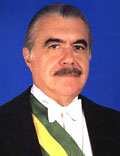José Ribamar Ferreira de Araújo Costa was educated as lawyer in the University of Maranhão. Elected an alternate deputy from Maranhão (1954), Costa temporarily filled a vacancy in the federal Chamber of Deputies until he entered the Chamber as a permanent deputy (1959-1966). When the military regime instituted a government-controlled two-party system, Costa, who legally adopted Sarney as part of his family name (1965), joined the pro-government National Renewal Alliance Party (Aliança Renovadora Nacional [Arena]). He won the election as governor of the State of Maranhão (31 Jan 1966 - 15 Mar 1971) and after completing his term he took a seat in the Federal Senate (1971-1985). Remaining loyal to the military government, Sarney was installed as president of Arena (1979) and later as president of the Social Democratic Party (PSD) (1980-1984). As Brazil was moving towards restoration of the civilian government, Sarney abandoned PSD and joined the Brazilian Democratic Movement Party (Partido do Movimento Democrático Brasileiro, PMDB), which in alliance with other opposition parties nominated Tancredo de Almeida Neves and Sarney candidates for president and vice-president respectively. Neves and Sarney won a sweeping victory at the indirect election of 19 Jan 1985, but the president-elect was unable to take office on 15 Mar 1985 as he had to undergo surgery. The outgoing president, João Baptista de Oliveira Figueiredo, and the military leaders adamantly opposed handing over the presidency to Sarney, but he assumed the presidency on 15 Mar 1985. After Neves died at 22:23 on 21 Apr 1985, the Congress declared the post of president vacant and Sarney was sworn in as president on 22 Apr 1985. The Sarney government defined two chief priorities in its policy — reconstructing democracy and combating galloping inflation that had been plaguing Brazil for years. A law was passed providing for the distribution of state-owned and unfarmed private land to peasant families. As inflation approached 300 percent and foreign debt exceeded US$100 billion, Sarney introduced the Cruzado Plan (28 Feb 1986). The government froze prices and wages and brought inflation to a standstill for a few months, but the plan eventually failed. The position of Sarney was strengthened when PMDB won a majority in both houses of the Congress at the general election of 15 Nov 1986. The National Constituent Assembly comprised of the Congress members began deliberations in February 1987 and drafted a new constitution, which went into effect 5 Oct 1988. The constitution provided for direct election of president, governors and mayors and a presidential system of government with extended electorate. After bitter discussions the Assembly approved a five-year term for Sarney and his successors. Meanwhile, the economy continued to disintegrate and inflation reached 934 percent in 1988. After the failure of the New Cruzado Plan, the Sarney government initiated the third major anti-inflation program (Summer Plan), but it never achieved its goals. Violent strikes repeatedly paralyzed the nation. After Sarney completed his presidential term on 15 Mar 1990, he was elected twice senator for the State of Amapá (1991-2003) and held the office of president of the Federal Senate (1 Feb 1995 - 4 Feb 1997). [1][2] |

